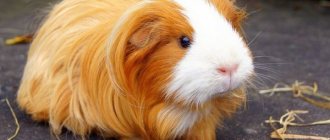Why a guinea pig bites is not that difficult to figure out. By nature, these animals are gentle, kind and peace-loving, but there are also wayward fluffies that can “snatch” your finger. The character of a particular pig is of great importance, but there are also general factors that throw the pet out of balance. Through bites, the non-speaking animal indicates needs to a person or signals discomfort. Therefore, the main task of the owner is to correctly understand why the guinea pig bites and help it.
Main causes of bites
You can initially determine whether a small pet bites or not by its breed. Most pigs do not bite without reason, but in some varieties this feature is genetic. A striking example is the Kui breed. These fluffies are bred for their meat. They are afraid of humans - it is written in their DNA. That's why they always bite - in the hope of protecting themselves.
In general, aggression without a reason is not typical for domestic guinea pigs. They are playful and sociable, and enjoy meeting their owner. What provokes a usually affectionate pet to such behavior? The main causes of aggression are various psychological factors.
Fluffies are often subject to stress, which naturally affects their behavior. The most common stressful situations that cause a defensive reaction in the animal in the form of bites include:
- relocation to a new place of residence;
- the presence of an external stimulus (noise, thunderstorm, etc.);
- fright (sudden home invasion, etc.);
- a feeling of discomfort (when the animal is held incorrectly or played with too actively);
- distraction from business (no need to disturb the pig when it sleeps, eats or drinks);
- excessively careful grooming (excessive scratching, etc.);
- violence (attempts to hug or play with a pet when he is not in the mood for this);
- communication with a stranger (any stranger - a visiting guest, etc.);
- detection of obstacles (do not put your hand in the animal’s path);
- negative experience of communicating with a person in the past (previous owner, etc.);
- illness or pregnancy (poor health makes the animal withdrawn, so it will stop all attempts to communicate with a bite).
These are the main situations. But there may be others - absolutely any stress can cause a bite.
Often a pig bites fingers by mistake - if they smell like food. And of course we must not forget about manifestations of love. By lightly biting the pet expresses its tenderness and affection for its owner. If your furry pet “chewed” your finger tenderly and painlessly, you should pet it in return.
If the cause of the pig’s aggressive behavior cannot be determined, you need to show the animal to a veterinarian.
Diseases
A sick animal needs peace and a calm atmosphere. It is not always possible to immediately notice that an animal is starting to get sick and continue to disturb it and pick it up. In this case, the sick animal may also begin to bite. During any medical procedures for the purpose of protection, the pig will be aggressive and will begin to bite, break free and make squeaks. Pregnant females are also very nervous, especially in the last term, and it is better not to handle them during this period, or you may get bitten.
The scale of a possible tragedy and first aid
A guinea pig bite in itself is not dangerous. But if the animal is sick, there is a high probability of infecting a person through a bite. You can catch the following from an infected pet through a bite:
- Pneumonia (it has been scientifically proven that human infection is possible from a fluffy with conjunctivitis, but, fortunately, this disease is quite rare for pigs).
- Felinosis, usually children and adolescents become infected with this mild disease through cats, but transmission of the infection through pigs cannot be ruled out.
- Rabies (a furry cat is rarely infected - he has few opportunities for this; a cause for concern is the appearance of a new animal in the house or the pet’s contact with a foreign animal).
- Toxoplasmosis (the risk of infection from mumps is minimal - cats are the main carriers of parasitic pathogens).
A pig bite can be quite painful. With strong negative emotions (fear, etc.), the pet is able to “bite” until it bleeds. If you are bitten by a guinea pig, you should immediately wash the bite site and then treat it with an antiseptic.
If the owner is sure that the pet is healthy, he need not worry about possible infection, the main thing is to treat the wound. If you are not sure, you should seek medical help. The examination will help determine the risk of infection. And if it is detected, only doctors can tell you what to do and prescribe the appropriate treatment.
Discomfort and behavioral characteristics
It is usually the owner who creates discomfort for the animal. For example, careless handling of a pig will cause the animal discomfort and may bite in response. If a conflict occurs between several individuals and at this moment the owner tries to intervene, then there is a possibility of getting bitten. An animal may perceive human hands as another danger and attack them. It is not very easy to separate animals that fight not very easily, not even with bare hands; their sharp teeth can get material.
When you get a guinea pig as a pet, give it time to get used to its new surroundings. The first days it is better not to let him in, let him be alone with himself more, let him get used to the surroundings, smells, sounds and people living in the house. If you decide to immediately look at the animal in your hands and try to play with it, then it may bite you, giving a defensive reaction. When you acquire an aged individual, you don’t know what kind of character it will have and how it will behave. The animal may have a bad experience with previous owners, it may be frightened, it may be a defensive reaction and therefore the animal may bite for the purpose of self-defense and lack of trust. A pet store is unlikely to provide you with reliable information about your pet’s past life.
How to deal with biters
The owner of a pig must remember that the pet does not bite just out of harm. It is important to understand the reason for this behavior of the animal and help it, and not try to take revenge. Physical punishment (in any form) is strictly prohibited. They will only make the situation worse. The animal will experience even more stress and will stop letting you approach it at all.
It is important to correctly understand the pig what exactly it is trying to convey to the owner. Maybe she is lonely, or maybe, on the contrary, she is being squeezed. Only love and observation can help you understand your pet’s emotions.
Guinea pig bites: what you need to know about bites
Why a guinea pig bites is not that difficult to figure out. By nature, these animals are gentle, kind and peace-loving, but there are also wayward fluffies that can “snatch” your finger. The character of a particular pig is of great importance, but there are also general factors that throw the pet out of balance. Through bites, the non-speaking animal indicates needs to a person or signals discomfort. Therefore, the main task of the owner is to correctly understand why the guinea pig bites and help it.
Teaching proper manners
If the animal bites (not in the form of a show of love, but in real pain), you need to carefully place it back into the home. In subsequent communications, you need to show maximum care. It is important to monitor which parts of the pet’s body are touched by the animal, and which parts, on the contrary, cause discomfort and cause protest on the part of the little pet.
Manifestations of friendliness in the behavior of a pet should be encouraged - give the animal treats. Gradually, the duration of the communication session with your pet should be increased.
The greatest result of taming is achievable while the animal is in childhood. That is why it is important, even in infancy, to accustom your pet to unpleasant procedures and processes necessary for care and maintaining hygiene. To minimize stress, you should follow simple rules:
- do not force the animal if it shows strong dissatisfaction with what is happening;
- eliminate external stimuli (sources of noise, etc.);
- do not disturb the animal during the adaptation period.
How to tame
Competent training is carried out like this:
- A finger is placed on the cage and removed if the pig shows aggression. The animal needs to say “no” - in a firm voice, but without raising the tone.
- The pig is given a treat, after which the finger is again applied to the bars of the cage. If your pet tries to bite again, you need to show him the gift, but you cannot give it away.
This process must be repeated every day until the result is achieved - the animal stops trying to “grab” the finger. Treats are the best motivation for a small rodent in any circumstances (reviews from owners are the main confirmation of this). The success of training will not be long in coming.
Violation of personal space
One of the most common reasons when animals use their teeth is some discomfort experienced by the pet. These include the following types of inconvenience:
- Restricting the animal's movements against its will - this often happens during treatment, for example, when giving medicine or giving an injection. True, there are also children who stoically endure unpleasant manipulations without causing harm to the person.
- Grooming (combing, bathing, examining the external condition, trimming claws, and so on). Most often, “biting” is exhibited by those pets who have not been accustomed to this type of care since childhood and may experience fear during what they consider to be painful procedures. Naturally, the animal will begin to defend itself, and teeth are the most suitable means of self-defense in this case.
- Actually, a violation of personal space when the owner tries to clean the cage at the most inopportune moment. By the way, many pets love to rake all the bedding under them, sitting with their fifth point on the bare rods. At the same time, any attempt on the part of a person to correct the uncomfortable, in his opinion, position of the rodent is met with a furious rebuff: some pigs “growl” in warning, while others angrily resist, and strive to bite the troublemaker.
- The animal is unhappy that it was picked up, squeezed, and not allowed to run around and enjoy freedom. At the same time, the pet becomes irritated and shows its displeasure with what is happening by biting.
- A guinea pig can also experience discomfort if it is handled incorrectly: some babies do not like scratching their belly, neck or ears, others become hysterical when their rump or fecal pocket is touched.
A rodent has bitten until it bleeds: what to do?
The situation when a domestic rat bites until it bleeds is alarming. This is not surprising, because history records so many diseases that were spread by rats. It was easy for rodents to bite a sleeping person and infect him with a deadly infection.
Decorative rats are not basement parasites. There is much less infection in their bodies. However, after a bite, you cannot stop the bleeding for some time so that all the bacteria that have entered it have time to get out. Next, the resulting wound is washed with a soap solution, for the preparation of which it is preferable to use laundry soap. Afterwards, the bite is treated with an antiseptic, and the edges are cauterized with iodine.
After being bitten by a rat until it bleeds, you will have to consult a doctor for vaccination against viruses that can infect your pet rodent.
Mumps symptoms
So, the following symptoms indicate the need for treatment for mumps:
- the temperature rises sharply (sometimes up to 40 degrees),
- joint and muscle pain,
- headache,
- chills and fever (but this symptom does not always appear),
- pain behind the ears, in front and behind the earlobe,
- weakness and lethargy,
- sharp pain when swallowing and chewing food,
- increased salivation.
But the main marker of the disease is gumboil and swelling behind the ears, and sometimes under the jaw. The sublingual glands can also be affected by the disease. Inflammation persists for up to 10 days; flux usually reaches its maximum on the 3rd day. The child remains contagious until the 10th day of illness. If mumps symptoms are detected early, treatment is faster and without possible complications.
Complications
Treatment of mumps in children can be complicated by secondary diseases. Glandular organs are considered weak points when mumps is affected, so common complications are:
- pancreatitis (pancreas),
- oophoritis (ovaries),
- atrophy, orchitis, priapism, infertility (testicles),
Meningitis, encephalopathy, otitis media, hearing loss, and sometimes complete deafness also occur. These diseases are characterized by the following alarming symptoms:
- vomiting and stomach pain,
- apnea,
- convulsions,
- increased drowsiness,
- prolonged fever
- enlargement and pain in the testicles.











